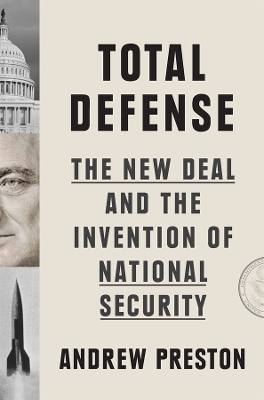
Total Defense
The New Deal and the Invention of National Security
Seiten
2025
Harvard University Press (Verlag)
978-0-674-73738-9 (ISBN)
Harvard University Press (Verlag)
978-0-674-73738-9 (ISBN)
In the 1930s, amid rising fascism, FDR and the New Dealers invented the doctrine of national security, which obligated the state to guard against not just territorial invasion but also remote threats to the “American way of life.” Total Defense explores how the new idea of national security transformed the United States and its place in the world.
The story of how FDR and fellow New Dealers created the idea of national security, transforming the meaning of defense and vastly expanding the US government’s responsibilities.
National security may seem like a timeless notion. States have always sought to fortify themselves, and the modern state derives its legitimacy from protecting its population. Yet national security in fact has a very particular, very American, history—and a surprising one at that.
The concept of national security originates in the 1930s, as part of a White House campaign in response to the rise of fascism. Before then, national self-defense was defined in terms of protecting sovereign territory from invasion. But President Franklin D. Roosevelt and his circle worried that the US public, comforted by two vast oceans, did not take seriously the long-term risks posed by hypermilitarization abroad. New Dealers developed the doctrine of national security, Andrew Preston argues, to supplant the old idea of self-defense: now even geographically and temporally remote threats were to be understood as harms to be combated, while ideological competitors were perilous to the “American way of life.”
Total Defense shows it was no coincidence that a liberal like Roosevelt promoted this vision. National security, no less than social security, was a New Deal promise: the state was obliged to safeguard Americans as much from the guns and warships of Nazi Germany and imperial Japan as from unemployment and poverty in old age. The resulting shift in threat perception—among policymakers and ordinary citizens alike—transformed the United States, spearheading massive government expansion and placing the country on a permanent war footing.
The story of how FDR and fellow New Dealers created the idea of national security, transforming the meaning of defense and vastly expanding the US government’s responsibilities.
National security may seem like a timeless notion. States have always sought to fortify themselves, and the modern state derives its legitimacy from protecting its population. Yet national security in fact has a very particular, very American, history—and a surprising one at that.
The concept of national security originates in the 1930s, as part of a White House campaign in response to the rise of fascism. Before then, national self-defense was defined in terms of protecting sovereign territory from invasion. But President Franklin D. Roosevelt and his circle worried that the US public, comforted by two vast oceans, did not take seriously the long-term risks posed by hypermilitarization abroad. New Dealers developed the doctrine of national security, Andrew Preston argues, to supplant the old idea of self-defense: now even geographically and temporally remote threats were to be understood as harms to be combated, while ideological competitors were perilous to the “American way of life.”
Total Defense shows it was no coincidence that a liberal like Roosevelt promoted this vision. National security, no less than social security, was a New Deal promise: the state was obliged to safeguard Americans as much from the guns and warships of Nazi Germany and imperial Japan as from unemployment and poverty in old age. The resulting shift in threat perception—among policymakers and ordinary citizens alike—transformed the United States, spearheading massive government expansion and placing the country on a permanent war footing.
Andrew Preston is Professor of American History and Fellow of Clare College at Cambridge University. He is the author of The War Council: McGeorge Bundy, the NSC, and Vietnam and the prizewinning Sword of the Spirit, Shield of Faith: Religion in American War and Diplomacy. His writing has appeared in the Washington Post, London Review of Books, and Foreign Affairs.
| Erscheinungsdatum | 26.04.2025 |
|---|---|
| Verlagsort | Cambridge, Mass |
| Sprache | englisch |
| Maße | 156 x 235 mm |
| Gewicht | 642 g |
| Themenwelt | Geisteswissenschaften ► Geschichte ► Regional- / Ländergeschichte |
| Sozialwissenschaften ► Politik / Verwaltung ► Staat / Verwaltung | |
| ISBN-10 | 0-674-73738-5 / 0674737385 |
| ISBN-13 | 978-0-674-73738-9 / 9780674737389 |
| Zustand | Neuware |
| Informationen gemäß Produktsicherheitsverordnung (GPSR) | |
| Haben Sie eine Frage zum Produkt? |
Mehr entdecken
aus dem Bereich
aus dem Bereich
Träume und Macht : eine Biografie
Buch | Hardcover (2025)
C.H.Beck (Verlag)
CHF 61,60
Buch | Softcover (2025)
Hentrich und Hentrich Verlag Berlin
CHF 54,60


